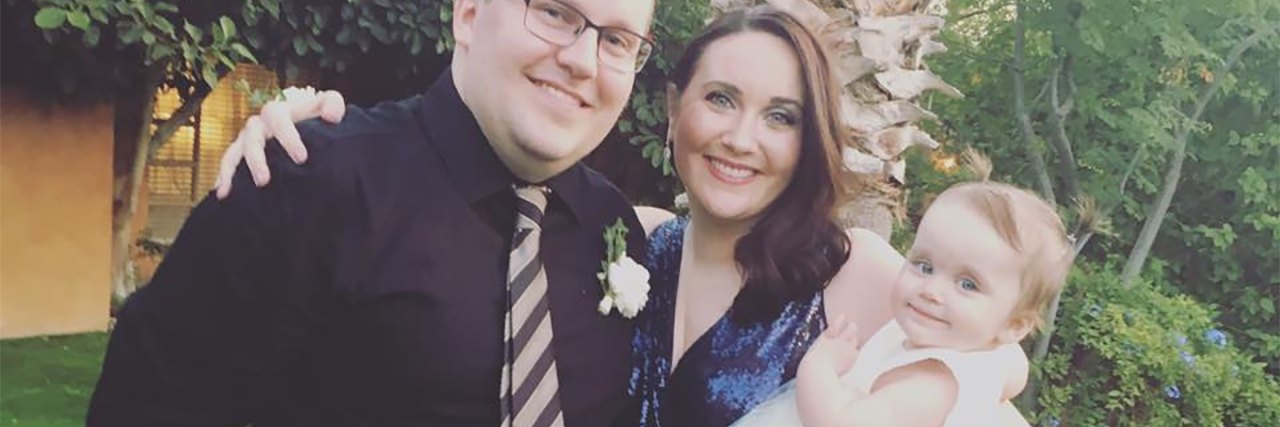Two weeks after my daughter was born, my husband had checked me into an outpatient mental health hospital.
I hadn’t slept for 11 days after Brynn came into the world: I was figuring out (and attempting to keep up with) breastfeeding, adjusting to my newborn’s sleep schedule, and overthinking this new motherhood lifestyle which comes at you 500 mph after your child is born… no matter how much you prepare, read maternity articles and parenthood books, watch videos of breastfeeding, or discuss new parenthood with veteran parents.
But I should really start with this: I have been managing anxiety for 10 years. When my husband and I decided to get pregnant, I had worked with my psychologist on an antidepressant dose that would be “low enough” for a safe pregnancy. (Though, you should know there is no guarantee of a “safe” pregnancy no matter what dosage of medicine one is taking.)
My husband and I were also diligent to find an OB-GYN who specialized with women who deal with anxiety and depression. With that, Adam and I were prepared — due to my mental health history — that I might have postpartum depression.
What we didn’t prepare for was postpartum psychosis.
I’m not going to get into the nitty-gritty details of the psychosis; I’m still embarrassed and overcoming this shame (though I know there should be no guilt). Let’s just say that it came to the point where my 11-day-old daughter was in danger in my sole care due to illogical thinking, thanks to insomnia and chemical imbalance by a hormonal release after giving birth.
I had never, ever heard of postpartum psychosis until I spent five days in the hospital coming out the irrational fog I had unknowingly entered after those days of insomnia.
When I left outpatient treatment, although I was on new antipsychotic medicine that would no longer allow me to breastfeed, there wasn’t a mother with this background to empathize and share this defining moment in my life.
It felt isolating, shameful and lonely. Holding Brynn when I returned home, I wondered if I was fit to be this amazing little girl’s mother.
Yes, there were others dealing with delusional and dangerous beliefs associated to bipolar disorder, depression and anxiety at hospital groups, but none of these people (and by people, I mean men and women) who had just given birth.
That’s when my mother connected me to Katherine at Postpartum Progress.
When I reached out to her, Katherine was running errands and endlessly busy, but stopped everything she was doing to personally call me and share her story of postpartum obsessive-compulsive disorder (OCD) after the birth of her first child in order to help me feel “normal” and safe about my situation.
I cannot tell you the weight that left my shoulders by telling me I shouldn’t be ashamed, that this is natural, and the postpartum depression onset by the psychosis is going to get better. And, it doesn’t necessarily happen with every birth.
Although I haven’t talked to Katherine since that phone call (talking about this topic is so vulnerable and still fresh with me, especially since I could never imagine hurting my daughter), it has been an up-and-down journey to find what medications and lifestyle balances work for me as a mother.
I am not the person I was before my daughter, but I am better thanks to this experience and certainly have a deeper understanding of my strengths and limits.
My happy-and-healthy daughter is now 10 months this December, and I can say I am happy. I can also say that 2017 was the happiest year of my life: equal parts joy, equal parts difficult.
But as with motherhood, this journey is about self-discovery.
I found a female psychiatrist who deals with postpartum depression. I now take medication that doesn’t make me sleepy 24/7. (After I left the hospital, I was put on medication that would help me sleep due to the insomnia and manage the irrational thoughts.) And instead of teaching full time, I now spend mornings with my daughter and spend afternoons teaching.
I’m sharing this story due to this one reason:
When I had hesitantly and half-heartedly shared my story of postpartum psychosis with a fellow mother with a daughter, she responded, “I don’t know what that is.”
And, it was left at that.
My hope is that there will be more support and education for women who have had postpartum psychosis, and who shouldn’t feel ashamed for discovering the balance in her life which will inevitably happen with the journey of motherhood.
As a mom — as a new mom — the most important factor is that in order for your child to be the healthiest individual, it’s important to take care of yourself first to be the best parent you can be to your children.
At this moment in my life, I feel I can be that best parent for my daughter (and best partner to my husband), but know that — as with most experiences in life — it is progress.
Editor’s note: Please see a doctor before starting or stopping a medication.
If you or a loved one is affected by postpartum depression or other postpartum disorders and need help, you can call Postpartum Support International‘s hotline at 1-800-944-4773.
We want to hear your story. Become a Mighty contributor here.
Image via contributor

